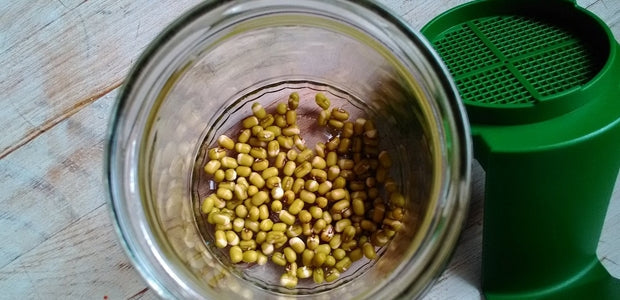Germination is easy, ecological and economical. Fresh food is becoming increasingly scarce and hard to fit into our budgets. Sprouting is the solution for sourcing fresh, nutrient-packed food all year round. Sprouting is a simple way to breathe new life into your everyday dishes. To help you, I've summarized the "how and why" of sprouting in a few sentences in the following article. However, you should know that it can be a whole new food sphere to discover. So go ahead, add living foods to your favorite meals and become a "bon vivant"!
Why sprouting?
When dried seeds are germinated, they become alive again, and a sprout can be seen growing. The sprouting process dramatically increases the seed's vitamin, mineral and amino acid content, making these nutrients easier to assimilate. What's more, sprouts provide up to 100 times more enzymes than raw fruit and vegetables! Enzymes are the "micro-biochemists" essential to good digestion and all our body's other functions. Often deficient in vitamins, minerals and enzymes, we can all benefit from adding sprouted seeds to our daily meals. They promote cell regeneration thanks to their high content of antioxidants, vitamins, minerals and enzymes. chlorophyll and oxygen. This helps to combat acidity, pain and inflammation. It goes without saying that this dietary addition is ideal for all therapeutic diets or for revitalizing your vital, physical and psychological energy.
How does sprouting work?
There are a number of different sprouting systems available in stores, or you can simply invent your own at home. Depending on your personal tastes, you can opt for :
- homemade germinators with glass jars and an added grid
- glass jars with perforated lids
- tiered sprouters, earthenware or plastic
You can also use a pottery sprouter tree for delicate, mucilaginous seeds such as flax and chia, or you can simply use a large jam jar with gauze and a rubber band to hold it in place.
Whichever system you choose, here's the procedure to follow;
- Soak a tablespoonful of seeds overnight (you'll judge the ideal quantity with practice, depending on the type of seeds you choose).
- The next morning, discard the water and rinse the seeds.
- Rinse them, morning and evening, until they reach the maturity you prefer: sprouts or sprouts.
Here are a few suggestions for seeds that are quick and easy to sprout, along with their particular benefits:
- sprouts broccolibroccoli sprouts are rich in vitamins A, K, E and folic acid. It has 12 times more anti-cancer power than the vegetable itself, not to mention all the nutrients it contains.
- visit red cloverbecause its shoots contain all the essential amino acids and are rich in vitamins and minerals, antioxidants and dietary fiber.
- l'alfalfaAlfalfa is a classic, one of the richest in nutrients, containing all the vitamins, even K, which is rare among plants. It contains 20% protein and all 8 essential amino acids. The husks are more resistant, but patience will pay off!
- visit legumesare very rich in protein, vitamins and folic acid, but it's their abundance of minerals that really catches the eye! Sprouts appear quickly, and the shoots are fresh and delicious.
I invite you to discover Daikon radishradish buckwheatbuckwheat sunflower seedthe pumpkin seedthe quinoaetc. There are also delicious and fun mixes to try, such as a oriental blend or a sandwich mix... Go ahead, explore!
Tips and tricks :
- Don't expose them to direct sunlight
- Never eat the seed husks, as they are harmful to your health.
- Use the soaking water to water your plants, as it is highly energetized.
- Sprouts or shoots can be stored for several days in the refrigerator.
Let's face it, the idea of adding instead of taking away is always more pleasant! So do yourself a favor and add a small handful of freshly sprouted seeds to your dishes, filled with vital energy, amino acids, fatty acids, natural sugars, vitamins, minerals and enzymes! It's beneficial and economical!
Cheers!
About the author
Naturopaths of La Boite à Grains
Team of licensed and certified naturopaths (ND) in Gatineau, Outaouais.
Original article written by Kimberly-Ann Waters, Naturopath, Naturotherapist, Certified Colon Hygienist


